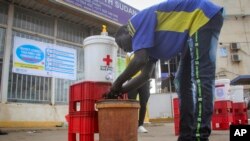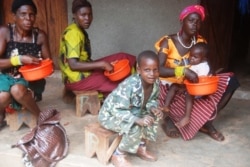Aid and health officials in South Sudan say the COVID-19 pandemic is disrupting access to important health services, including those for women and girls and HIV/AIDS patients.
At an event where reproductive health kits were being handed over to South Sudan’s health ministry in Juba on Thursday, Dr. Mary Otieno, the country representative for the United Nations Population Fund (UNFPA) in South Sudan, said COVID-19 has diverted world attention from critical health services.
“We should not forget that reproductive health needs of women and girls remain or even become more acute," said Otieno. "We know that babies will not heed the restriction movements, they will not heed social distancing when the time is right to come out, so the services are needed more than ever." Otieno.
Otieno called on international donors to continue funding the reproductive health sector as they respond to the pandemic.
“Women will continue getting pregnant, they will need to give birth, those need services, people will need contraceptives and so we cannot disrupt the services,” said Otieno.
UNFPA invests more than $4 million each year on reproductive supplies and equipment in South Sudan, according to Otieno.
HIV patients not getting treatment
Benjamin Loki, who runs HIV testing and counseling services at the Juba Teaching Hospital, said the number of HIV patients receiving treatment at the center has dropped during South Sudan’s COVID-19 partial lockdown.
“The number of people living with HIV in our facility is around 9,500 and the active ones who are taking drugs on a monthly basis are 3,761. In April we lost the follow-up of 61 clients and still we are tracing them to make sure we get them back to take their drugs,” said Loki.
To curb the number of HIV/AIDS patients who drop the treatment program during COVID-19, Loki said the hospital is providing medicine to some 9,000 HIV patients for six months rather than the normal three-month period.
“When COVID-19 came to South Sudan, we changed our strategy of giving drugs to clients,” Loki told VOA’s South Sudan in Focus.
People living with HIV could die if they contract COVID-19 because their immune systems are compromised.
As of Wednesday, South Sudan reported 481 confirmed cases, six recoveries and six deaths from COVID-19.





